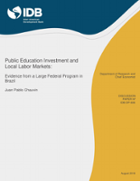Public Education Investment and Local Labor Markets: Evidence from a Large Federal Program in Brazil
Date
Aug 2018
Do education investments improve regional labor market outcomes? In principle, education could lead to higher local productivity, but potential benefits to local economies could be muted if the educated workers leave in search of better opportunities, or if shifts in the supply of skills outpace demand growth. I use a large program that redistributed public education finance across Brazilian municipalities (FUNDEF) as a source of exogenous variation to empirically study the effects of expansions in public education expenditure on attainment and labor market outcomes at the individual and the local economy levels. The program was successful at improving educational attainment levels for individuals and regions, specially at the primary school level. For individuals, education led to higher wages -mainly by enabling workers to migrate to more productive places- but my estimates of returns to schooling turn negative when I control for region-of-work characteristics. For regions, the program worsened wages and other labor market outcomes but not employment, suggesting that the increased supply of educated workers outpaced demand growth.




